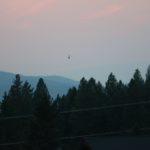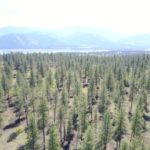Smoke
Posted: August 24, 2017Source: The Forest Blog by Russ Vaagen
Hot Weather Equals Summer Smoke

Image from: The ForestBlog
August 2017 has covered much of the West with a blanket of smoke. Although the media has been portraying this as coming from the BC fires, there are fires throughout the region and there are bound to be more. This is unfortunate for everyone and our forests.
The weather is hot and we haven’t even seen all the typical dry lightning storms that happen in the intermountain areas yet. We hear a lot of people on social media like Facebook, Instagram, LinkedIn, and Twitter commenting that this smoke is natural. Some have even commented that it’s just like being next to a campfire. The unfortunate truth is that it’s much worse.
Wildfire Smoke Pollutes Much More
This study from Georgia Tech clearly articulates that fires from these unnaturally large and hot fires spew much more pollutants into the air than we ever knew. It’s harmful to humans, animals, and the environment. The reason is the amount of fuel left in the forests. These fires start easier and burn much hotter because there are too many small and medium trees as well as a buildup of downed woody debris and brush. These fires are also nearly impossible to put out because of the sheer volume of burning fuel.
I am not about to say that managing our forests will result in the removal of all fires. What we can do, however, is reduce the fuels by thinning and logging. This will actually save the forests. We can leave the forest with natural spacing. This will result in fires that burn controllably to benefit the forest rather than destroy it.
Management Helps Reduce Smoke

Managed forest with prescribedfire
What can we do with the material removed from these forests? We can make building products of nearly all types. We can use the smaller material to create chips for the pulp and paper industries. Other products can be used to make wood pellets, particle boards, and biomass power. All of these are far better than smoke-filled air and burnt wastelands.
So, what do we want? Do we want products that store carbon or do we want massive exposure to harmful smoke and carbon pollution? Our cities are working to take measures to reduce CO2 emissions. Those efforts might be great, but if we continue to allow our forests to be unnaturally thick we create many more times the pollution of our cities every summer. The choice is ours to make.

